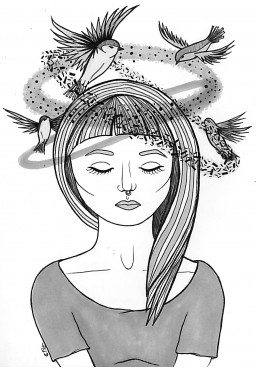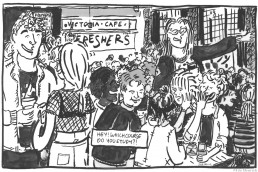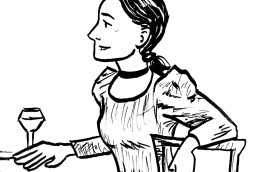by Emily Holmes
Image credit: PeacefulPirateNinja
Content Warning: self-harm
I always thought I’d be graduating with a degree at the age of 21, after enjoying school, A Levels and going on to study psychology at the university of my choice. However, my mental health had something to say about that. When the depression first hit hard (I say ‘hit hard’, though it was actually a slow burner looking back), I fell apart. I couldn’t concentrate. I lost any previous enjoyment I used to get when studying. I felt dead inside and started self-harming as a way of coping.
There’s a long story between then and now, but here I am, aged 27, with a diagnosis of Borderline Personality Disorder and Generalised Anxiety Disorder, but half way through a degree in education. The path wasn’t what I imagined it would be, but along the way I have gained some life experiences I may not have wished for but which I intend to use for something good.
At school, the best decision I made was to talk to a teacher I trusted. I remember rehearsing in my head what I would say, but I ended up just pulling her to one side one day and saying “I feel really, really sad, and when I feel worse I cut myself”. It wasn’t widely talked about at the time so I didn’t actually realise the impact of what I was doing until she reacted. She took me to one side, and just listened. From that day onwards I received support with my studies, emotional support from the school staff, and support on the days I needed to sit somewhere just to stay safe.
It’s not easy. I did leave school without A Levels as I needed to focus on my mental health, but when I felt ready I did an online access course which enabled me to get a place at university. Being at university is still a struggle but I have found some coping mechanisms that help ease my anxieties (which are transferable to school and college too). Here they are:
In the beginning, before you even start, do your research on where you are going. Visit the institution a few times to familiarise yourself, not just with the campus but with the staff too. Find out where your first lectures are going to be held in advance; this can alleviate stress on the day of attending.
Talk to someone. Your university will have a disability service — use it! Even if just for an initial meeting to discuss your needs. They may be able to give you practical help via equipment (for example, a dictaphone if you have difficulty concentrating or are prone to dissociation, which allows you to listen to the seminar later). They can also advise on local counselling services within the area, and the university’s specific support services. It’s worth exploring what your different options are, and what services exist, before a crisis occurs — that way you can be prepared. If you don’t feel comfortable going in person, there will be an email contact, usually found on the website, where you can put forward your questions in writing.
If you would like to get involved with your mental health society, do it! It can be a great place to meet like-minded people, to help others, trade coping mechanisms and just be around people with whom you can be yourself.
You will usually be given a director of studies/personal tutor/pastoral tutor who is your point of contact throughout the degree programme. They may never actually teach you but they will be aware of the demands of your course, and if you trust them, I would recommend being honest from the outset. They can only help you if they know your situation.
If you don’t feel comfortable doing this but have a lecturer you trust, talk to them.
The more open you are from the beginning, the more the university staff can help you before things get too tough. Also, in cases where you may need to request an extension, it will be less stressful to do so if your tutor is aware of your needs.
I have found that on days that I don’t feel strong enough to go in, some lecturers (time dependent) have been happy to go through the slides on a one-to-one basis. Obviously, this can’t be a permanent arrangement, but on a day that is particularly bad it’s worth reading through the slides after the lecture/seminar and requesting a meeting if you want further help. Don’t be scared of asking.
Lists and planners will be your best friend. Either a weekly whiteboard, a diary, a timetable of your deadlines/exam dates (or all of the above!) — whichever you find most helpful. Juggling lots of modules and assignments can be difficult, but the more you have written down, the less you need to keep it in your head, which can help reduce your stress. These ‘reminder’ notes can be stuck on your wall if you want to see them all the time, or behind a cupboard door/in a drawer if that’s less intimidating. At the end of the day it’s about what you can do to make surviving university easier and more manageable for you.
And lastly, well done for getting to where you are now. Your story may not be like others, but why be boring? Your story is yours. Own it and be proud of it.
Emily Holmes
Emily is a 27-year-old from Sheffield with a diagnosis of Borderline Personality Disorder and Generalised Anxiety Disorder. Emily works in Children’s Services and studies Education, Culture and Childhood at the University of Sheffield. Emily loves writing, running, cats and anything fitness related!
PeacefulPirateNinja
Remi Jokiranta, aka PeacefulPirateNinja, is a 20-year-old psychology student from Finland currently studying in Edinburgh. They are very passionate about human rights (especially women’s and LGBTQIA+ rights) and animal rights and they advocate for these causes in many different ways (street activism, social media, art, etc.). They love to draw, paint and write poems. They’re also very passionate about self-love, addressing mental health issues and being inclusive to everyone.









